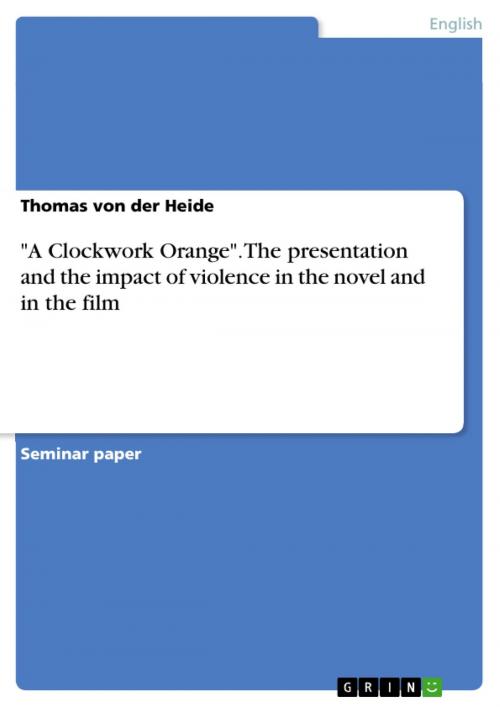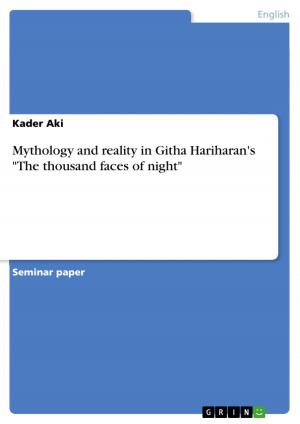'A Clockwork Orange'. The presentation and the impact of violence in the novel and in the film
The presentation and the impact of violence in the novel and in the film
Fiction & Literature, Literary Theory & Criticism, British| Author: | Thomas von der Heide | ISBN: | 9783638506816 |
| Publisher: | GRIN Publishing | Publication: | June 1, 2006 |
| Imprint: | GRIN Publishing | Language: | English |
| Author: | Thomas von der Heide |
| ISBN: | 9783638506816 |
| Publisher: | GRIN Publishing |
| Publication: | June 1, 2006 |
| Imprint: | GRIN Publishing |
| Language: | English |
Seminar paper from the year 2002 in the subject English Language and Literature Studies - Literature, grade: 2,0, University of Cologne (Institut für Anglistik), course: Novels and their film adaptations, 9 entries in the bibliography, language: English, abstract: After the release of Stanley Kubrick's film version of 'A Clockwork Orange' in 1971, Anthony Burgess's original novel of 1962 and the film were obstinately criticised to be senselessly brutal and it was (and is) said (until today) that both Burgess and Kubrick glorified violence with their works. Although in 'A Clockwork Orange', a lot of different themes are dealt with - for example politics, music, art or themes of philosophical nature - the violence in the book and on screen are the most concerned about things when critics write about 'A Clockwork Orange'. But not only critics, also 'normal' readers (or viewers) regard the violence to be the most remarkable thing about the whole book (or movie). One simply has to look at the website of the internet-bookstore 'Amazon' (www.amazon.de) to see that the main part of the readers' reviews for the book by Anthony Burgess comment on the violence and the brutal crimes committed by the story's protagonists: Alex DeLarge and his 'droogs'. It is interesting that most of the readers that commented on the book also gave a statement about Kubrick's film adaptation. It looks like the whole discussion about violence in 'A Clockwork Orange' really first came up when Stanley Kubrick's movie version hit the theatres. But why this violence? Does it stand for itself? Are rape and murder obeyed fetishes of Burgess and Kubrick? Or is there something more in the story, that makes it indispensable to present violence in the extreme way Burgess and Kubrick did? This text will explain the function and the intention of presenting violence in 'A Clockwork Orange'. It will show the differences between the way of presenting violence in the original novel and the film version and why author and director decided to portray the protagonists' brutality in unlike ways, including the impact they have on the reader and the viewer. This text will conclude that in the novel and the film version, violence in 'A Clockwork Orange' serves to discuss other and more important themes included in the story.
Seminar paper from the year 2002 in the subject English Language and Literature Studies - Literature, grade: 2,0, University of Cologne (Institut für Anglistik), course: Novels and their film adaptations, 9 entries in the bibliography, language: English, abstract: After the release of Stanley Kubrick's film version of 'A Clockwork Orange' in 1971, Anthony Burgess's original novel of 1962 and the film were obstinately criticised to be senselessly brutal and it was (and is) said (until today) that both Burgess and Kubrick glorified violence with their works. Although in 'A Clockwork Orange', a lot of different themes are dealt with - for example politics, music, art or themes of philosophical nature - the violence in the book and on screen are the most concerned about things when critics write about 'A Clockwork Orange'. But not only critics, also 'normal' readers (or viewers) regard the violence to be the most remarkable thing about the whole book (or movie). One simply has to look at the website of the internet-bookstore 'Amazon' (www.amazon.de) to see that the main part of the readers' reviews for the book by Anthony Burgess comment on the violence and the brutal crimes committed by the story's protagonists: Alex DeLarge and his 'droogs'. It is interesting that most of the readers that commented on the book also gave a statement about Kubrick's film adaptation. It looks like the whole discussion about violence in 'A Clockwork Orange' really first came up when Stanley Kubrick's movie version hit the theatres. But why this violence? Does it stand for itself? Are rape and murder obeyed fetishes of Burgess and Kubrick? Or is there something more in the story, that makes it indispensable to present violence in the extreme way Burgess and Kubrick did? This text will explain the function and the intention of presenting violence in 'A Clockwork Orange'. It will show the differences between the way of presenting violence in the original novel and the film version and why author and director decided to portray the protagonists' brutality in unlike ways, including the impact they have on the reader and the viewer. This text will conclude that in the novel and the film version, violence in 'A Clockwork Orange' serves to discuss other and more important themes included in the story.















